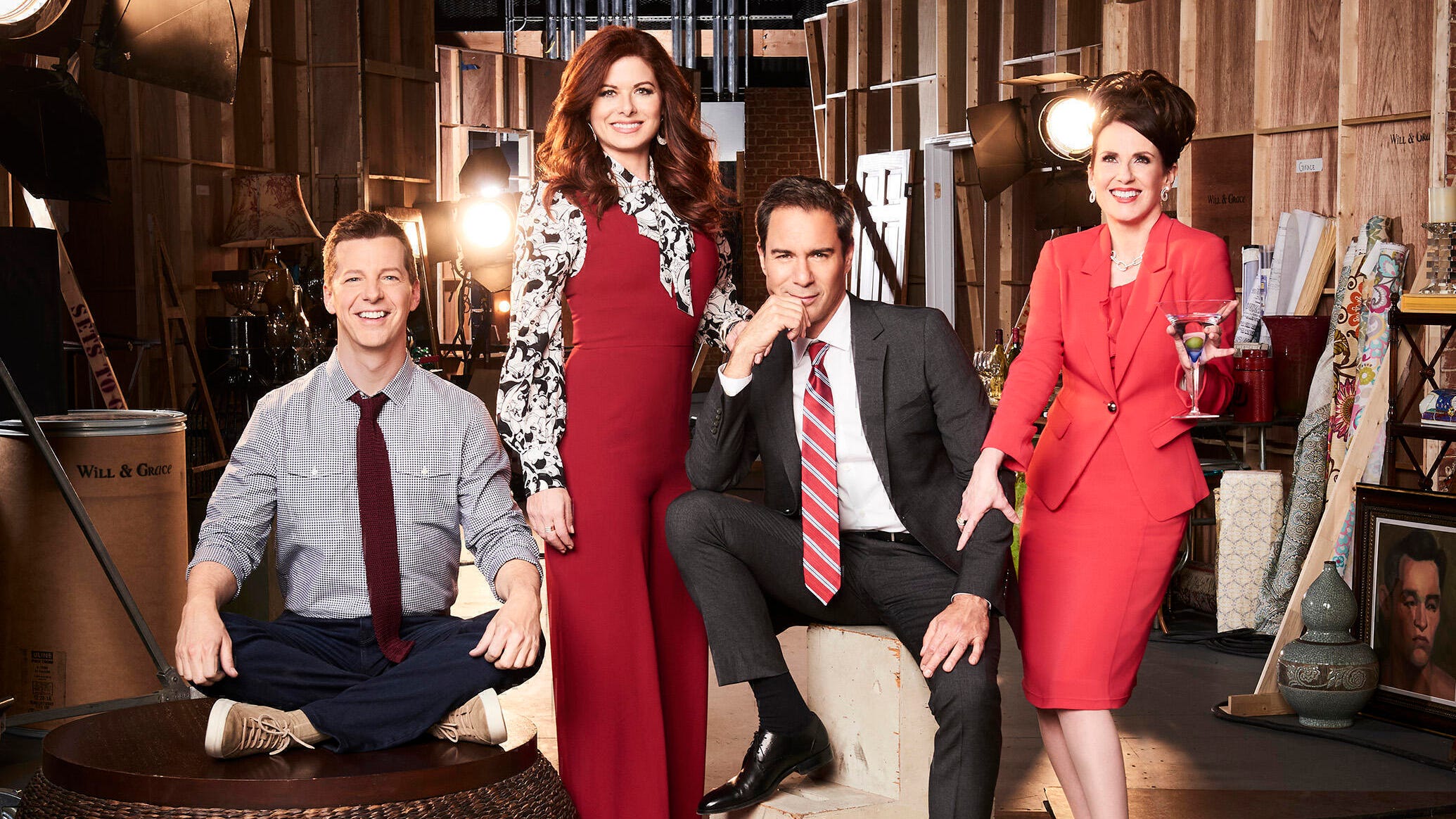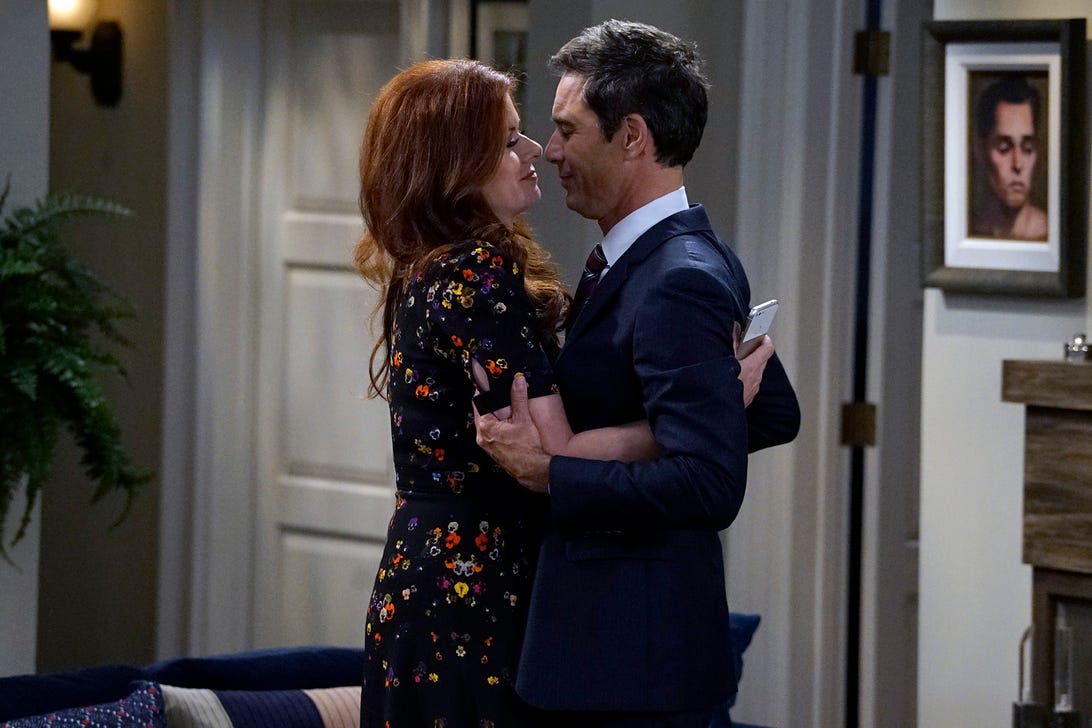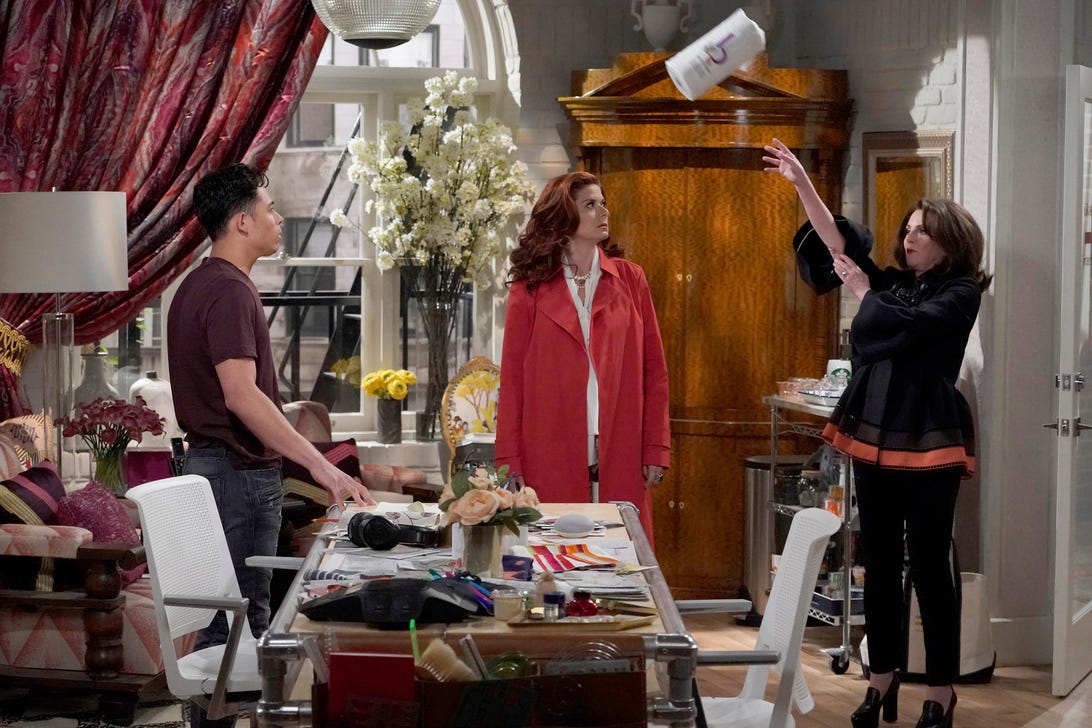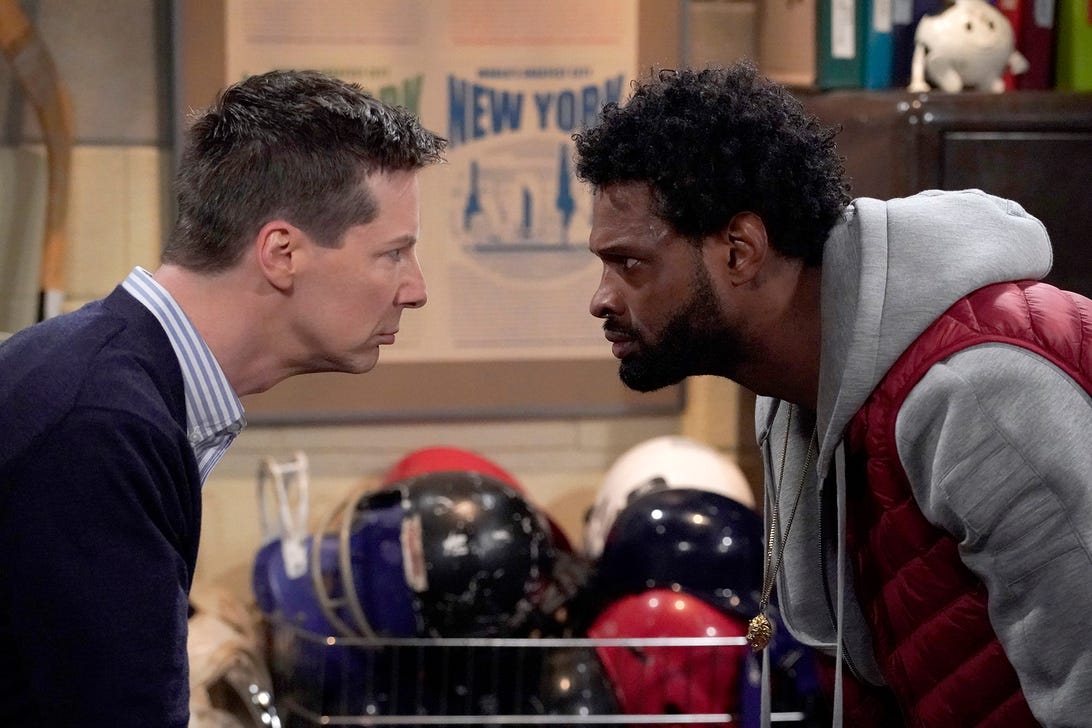
Best of Year: In 2017, 'Will and Grace' Taught Reboots How To Age Gracefully
How the most unlikely of second comings became the gold standard for all others
Watching any TV show get made in real-time is a magical experience, but judging by the rapt expressions on people's faces at a taping of Will & Grace one October day in Los Angeles, this taping had much greater significance. Will & Grace's enormous impact can be easy to forget in an era when RuPaul is a two-time Emmy winner and gay characters are on mainstream network shows. But for the many over-30 gay and lesbian people in the audience, watching the original Will & Grace cast back in action swept them back in time to when the sitcom was their only real connection to the queer community. Will & Grace was, for people of all walks of life, the first glimpse of homosexuals who weren't predators, deviants, or jesters but rather thriving, successful human beings. Twenty years after the show created a paradigm shift, it's causing quakes again -- this time for being the yardstick by which all reboots should be measured.
As the tanking of reboots including 24, Dynasty, Prison Break, Melrose Place and Dallas proved, nostalgia gets a repurposed show only so far. Far too often, reboots change too much: they slap younger, "hotter" faces onto characters viewers love; they fail to capture the chemistry that attracted fans the first time. But the biggest killer of the reboot is that the cultural landscape changes so quickly, that often what was engaging and game-changing about these properties is no longer a relevant conversation. Will & Grace, unlike others of its stripe, managed not only to keep its core and somewhat dated humor as scathing as ever, but also balance it with the current queer zeitgeist by reframing who was the butt of the joke. Like a fabulous face lift, Will & Grace 2.0 maximized subtlety and proved that yes, this old queen can regain her throne.

Debra Messing as Grace Adler, Eric McCormack as Will Truman, Will & Grace
NBC, Chris Haston/NBCWhereas most reboots arrive at the behest of networks keen to cash in on a sure thing, Will & Grace turned IP indulgence on its head with the 10-minute viral short "#VoteHoney" in the innocent days of September 2016. Though "#VoteHoney" was born out of the Hillary-supporting team's desire to do something at a scary time for America, it was a master lesson of 21st century branding: build interest organically; capitalize on cultural relevance; respect consumers' voice and power; and then give them what they want. "I think Will & Grace was exactly right for its time and it's exactly right for the time we live in now," said Zeke Stokes, vice president of programs at GLADD, the LGBT media group to TV Guide. "It's difficult for lighting to strike twice. [Will & Grace] is able to step back in its old space in a refreshed way and bring along new audiences as well." Fan demand drove the conversation about the show, not corporate bigwigs; but once the decision was made to made it a formal go of it again, the creators had to tackle the herculean task of actually rebooting the show.
Staffing it was easy: all but a few of the returning writers and producers have been on board since Day 1. (But spare co-creator Max Mutchnick any flowery talk about his team being a "family": "I don't want to eat lunch with these people on the weekends," he told TV Guide, "so no we're not a family, but we're very close and honest and open.") More challenging was figuring out what to do with Will (Eric McCormack), Grace (Debra Messing) Jack (Sean Hayes) and Karen (Megan Mullally) 11 years later. Complicating that, critics pounced the minute the reboot was announced, wondering aloud if the characters -- particularly the flamboyant Jack -- would fit in a culture where stereotypes and trope-filled jokes can ruin a career with a few good tweets and think pieces.
The media is giving itself self too much credit in terms of what they think we were worried about. We couldn't have cared less about what anybody outside the building thought.
"We really stuck with our very brutal expectations of ourselves and our very brutal expectations and the unforgiving criticisms we level at our own work," Mutchnick said. Though Mutchnick and his creative partner David Kohan obviously stayed true to the original blueprint, Kohan concedes they momentarily considered big changes -- even a fleeting thought about making it single-cam -- and how today's identity politics would influence the material. Considering the ways in which both TV and the ways people consume media have evolved gave way to the questions, "What are we going to do change? How is this show going to reflect changing tastes? And the answer was don't." Mutchnick was more blunt. "The media is giving itself too much credit in terms of what they think we were worried about. We couldn't have cared less about what anybody outside the building thought." Overly PC concerns, he said, is "the bull--t that f--s with the sound of the script. Worrying about something being politically correct is the death of comedy, and the death of point of view."
Some of Will & Grace's DNA -- jokes that would today be considered fat-shaming, for example, or the quad's penchant for using now-nuclear words like "fairy" or "fag" -- would not fly in a new network sitcom, but on Will & Grace, they're hallmarks of authenticity rather than problematic. That's partly because the characters were allowed to age -- they are what a queer millennial watching the show would consider an older generation, like aunts and uncles that mean well but give terrible dating advice. Now, reading of the characters has changed from being people defining the frontier edges of queer spaces to charming and lovable anachronisms cherished within a much more inclusive modern queer culture.

Anthony Ramos as Tony, Debra Messing as Grace Adler, Megan Mullally as Karen Walker, Will & Grace
NBC, Chris Haston/NBCBut the part of the equation that truly allows the original tone of the show's humor to succeed is how Will & Grace has flipped its punchlines. Take Karen, the biggest source of the most egregious insults and political incorrectness in the show, who comes off not as incendiary but as satire in reboot. From the start, racism was implicit in her and Rosario's (Shelly Morrison) rich white lady/maid dynamic, but Karen made it overt with outrageously prejudiced comments (like the time she famously told Rosario that if not for her she'd be "flying back to Cucaracha on Air Guacamole with live chickens running up and down the aisle," in Season 1). While the microaggresions haven't changed all that much in the reboot considering Karen's relationship with Grace's new Latino assistant Tony (she tosses him a roll of paper towels an up-to-the-minute reference to Trump's "gift" to Puerto Ricans in October), Will & Grace understands that to keep her scathing one liners, the punchline can't be the Latino 'help'. Grace asks Tony in the very first episode of the new season if Karen offends him, establishing firmly that if anyone is to be ridiculed in this situation, it's Karen. Karen, GLAAD's Stokes said, exists to show Americans how offensive behavior looks. "I don't think anybody watching Will & Grace aspires to be Karen."
So yes, new Will & Grace stands by the flag it originally planted, even if, 11 years later, the foursome's humor has a post-ironic appeal. Still, as much as things have stayed the same, it's impossible not to notice some of the other subtle changes that speak to a more woke viewership. Rosario's farewell, for starters, showed Karen expressing legitimate feelings for her without the put-downs. Criticized in the past for minimal inclusion of people of color, Will & Grace has significantly more hues on screen: Jack's supervisor at the Boys & Girls Club in the Bronx is black and the children he bonds with there add more skin tones to the screen. Will & Grace will probably never cast minorities to score points ("We continue to make every effort we can," Mutchnick said.) but Kohan said he's aware of what not having a diverse set of recurring characters says in 2017.
"Shows that are lily white are not as interesting," Kohan said, adding that seeing Hamilton was a light bulb moment for him. After watching it, "anything with a monochrome cast seemed duller. It's like, 'Who are you doing this for?'" More exploration of the other letters in the LGBTQ acronym is coming too; Messing has promised Will & Grace will have more representation of bisexual and trans people, two queer identities untouched by the show in its original run.

Sean Hayes as Jack McFarland, Derek Gaines as Theodore, Will & Grace
NBC, Chris Haston/NBCSocial commentary will never be Mutchnick and Kohan's primary mission. That is and always will be making people laugh, but Will & Grace's subtle approach to "issues" is as much of why the humor of the reboot works. In one scene during the October taping for example, Jack makes a crack about Will's weight, prompting chuckles from the audience -- and Will retorts with shady reminder that fat jokes are dated and unfunny, garnering an even bigger laugh. That specific, meta observation illustrates the power in this reboot: the same cast, with the same creative team and the same humor isn't just funny but providing new teachable moments. With the exception of perhaps One Day at a Time -- Netflix's adaptation of Norman Lear's sitcom with a Cuban family -- no other reboot in recent history exists with such perfect purpose and timing to bring people (back) together. Will & Grace is comfort food with some nutrition snuck in.
